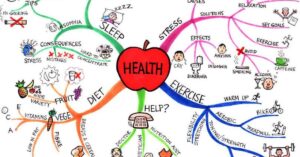Health is the cornerstone of a fulfilling and vibrant life, influencing every aspect of our daily experiences. It encompasses physical, mental, and emotional well-being, forming a balance that allows us to thrive. A healthy lifestyle is more than the absence of illness; it’s about embracing habits that energize the body and nourish the soul. Health is not just a goal but a lifelong journey of self-care and resilience.
In today’s fast-paced world, prioritizing health has become more crucial than ever. Stress, sedentary habits, and unhealthy choices often overshadow the importance of self-care. However, small, consistent changes can lead to transformative results, enhancing both longevity and quality of life. Let health be your foundation for achieving your dreams and building meaningful connections.
Physical Health
Physical health forms the cornerstone of overall well-being, encompassing the body’s ability to function efficiently and effectively. Regular physical activity strengthens muscles, boosts cardiovascular health, and improves stamina. Coupled with balanced nutrition and adequate sleep, maintaining physical health reduces the risk of chronic diseases and enhances quality of life.
To achieve and sustain physical health, it’s important to engage in activities that promote cardiovascular health, muscle strength, and flexibility. Simple habits, such as staying hydrated, sleeping well, and avoiding harmful substances, can make a significant difference in overall physical condition. Consistency is key in making physical health a long-term priority for optimal wellness.
Nutrition and Diet: Fueling the body for optimal performance.
Exercise and Fitness: Strengthening the body through movement.
Rest and Recovery: The importance of sleep and relaxation.
Preventive Health Care
Preventive health care focuses on proactive measures to maintain well-being and avoid the onset of diseases. Regular screenings, vaccinations, and healthy lifestyle choices are critical in detecting potential health issues early and preventing long-term complications. By staying on top of preventive care, individuals can reduce the risk of serious conditions and improve their quality of life. This approach saves time, money, and improves overall health outcomes in the long run.
Incorporating preventive health care into daily life involves simple actions like eating a balanced diet, exercising regularly, and managing stress. Routine check-ups and staying informed about health risks allow for early detection of issues that may otherwise go unnoticed. Prioritizing preventive health empowers individuals to live longer, healthier lives while minimizing the need for intensive medical treatment later on.
Regular Screenings and Check-Ups:
Detecting potential health issues early.
Vaccination and Immunization:
Protecting against preventable diseases.
Healthy Lifestyle Choices:
Reducing the risk of chronic conditions.
Healthy Habits

Healthy habits are daily practices that support physical, mental, and emotional well-being. Simple actions like eating a balanced diet, staying active, getting enough sleep, and managing stress can significantly enhance overall health. Consistency in these habits fosters long-term vitality and resilience against illness.
Adopting healthy habits can be as simple as drinking enough water, taking short breaks to stay active, and practicing mindfulness. Small changes, such as reducing processed foods and prioritizing relaxation, can have significant long-term benefits. By incorporating these habits into daily life, individuals can achieve greater resilience and prevent the onset of chronic health issues.
Balanced Nutrition: Fueling the body with essential nutrients.
Regular Exercise: Building strength and improving overall fitness.
Mindful Living: Managing stress and prioritizing mental well-being.
Work-Life Balance
Work-life balance is the ability to effectively manage both professional responsibilities and personal well-being. Achieving balance allows individuals to dedicate time to work, family, hobbies, and self-care, reducing stress and improving overall happiness. By setting boundaries and prioritizing tasks, people can avoid burnout and maintain their mental and physical health. A healthy work-life balance leads to increased productivity and satisfaction in both areas of life.
To maintain a good work-life balance, it’s crucial to set clear boundaries between work and personal time. Incorporating breaks during the workday, taking time off when needed, and engaging in activities that recharge the mind and body are essential practices. By finding this balance, individuals can enjoy fulfilling careers while also nurturing relationships and personal growth.
Setting Boundaries: Prioritizing time for work and personal life.
The Role of Flexibility: Adapting schedules to meet diverse needs.
Stress Management Techniques: Maintaining mental and emotional health.
Technology and Health

Technology can enhance health by providing access to medical information, fitness tracking, and telemedicine services. However, excessive screen time and sedentary behavior linked to tech use can harm physical and mental well-being. Striking a balance ensures technology serves as a tool for better health rather than a source of harm.
However, excessive reliance on technology and health can have negative impacts, such as sedentary behavior and screen time-related issues. It’s important to find a balance by using technology to improve health while also prioritizing physical activity and mental well-being. When used wisely, technology can revolutionize the way we approach healthcare, promoting better self-management and overall wellness.
Fitness Technology: Tools to monitor and motivate active lifestyles.
Digital Detox: Combating the effects of screen addiction.
Mental Health Apps: Support at your fingertips.
Benefits of Telemedicine: Revolutionizing healthcare accessibility.
Health Risks of Prolonged Screen Time: Understanding and mitigating the impacts.
FAQ’S
What is physical health?
Physical health refers to the condition of the body and its ability to perform daily tasks without discomfort or illness.
How can I improve my mental health?
Regular exercise, a healthy diet, social connections, and stress management techniques can boost mental health.
Why is preventive health care important?
Preventive care helps detect health issues early, improving treatment outcomes and reducing future risks.
What are some key healthy habits?
Healthy habits include eating nutritious foods, exercising regularly, staying hydrated, and getting enough sleep.
How does work-life balance impact health?
Maintaining work-life balance reduces stress and promotes overall physical and mental well-being.
Conclusion
Maintaining good health is essential for leading a fulfilling life, both physically and mentally. Adopting healthy habits, such as regular exercise, balanced nutrition, and stress management, significantly enhances overall well-being. Preventive health care and mindful choices can help prevent chronic conditions, ensuring a healthier future. By prioritizing work-life balance and mental wellness, we can achieve optimal health and lead vibrant lives.
Ultimately, good health is the foundation for a productive, joyful life. Focusing on physical health, mental health, and preventive care not only enhances our quality of life but also empowers us to reach our full potential.
Guest Blogger and Content Writer










